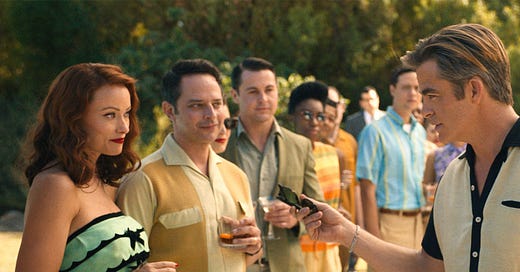“Don’t Worry Darling” is a Derivative and Pointless Prop for Controversy
Olivia Wilde’s latest film is preachy without being profound
After its highly controversial premiere at Venice Film Festival, the buzz around Don’t Worry Darling has been steeped in drama. By the time of its wide release, nearly every audience member was buying a ticket either because - or in spite - of the controversy. However, like many recent star-studded, drama-riddled productions, the movie is unfortunately far too inconsequential to justify the inordinate amount of buzz it had generated. Don’t Worry Darling is a visually impressive but substantially pointless production. It is a film that is preachy without being profound, and though entertaining, it doesn’t really ever move past the realm of mediocrity.
In a word, Don’t Worry Darling is frustrating. The movie has a lot going for it, but its incredibly messy conclusion completely diminishes any merits it earned in the first and second acts. The film opens on an idyllic 1950s Palm Springs-eque residential paradise for the employees of the ominous Victory Project, an elusive enterprise that sends mysterious tremors through the small town. Every morning like clockwork, the employees disappear into the headquarters upon a hilltop deep in the desert while their wives socialize and maintain the highly manufactured environment in which they exist.
Alice (Florence Pugh) and Jack (Harry Styles) are positioned for success within the Victory Project, consistently moving up in the company while living a utopian never-ending honeymoon. After we become familiar with the premise, the first act is promising. The disturbing reality of the dollhouse world becomes more and more prominent and the initiation of the slow spiral into madness is thoroughly captivating.
Before long, the world begins to come apart at the seams, both within the diegesis and from the external production. The first big mistake of Don’t Worry Darling is the casting choices. Florence Pugh seems to be the only one who follows through with a committed performance. Harry Styles’ acting ability was hideously overestimated, and pales poorly in comparison to Pugh’s talent. Additionally, director Olivia Wilde’s self-insertion is completely unnecessary and her involvement in the conclusion of the film is nothing more than narcissistic. Most of the other characters simply suffer from the writer’s inability to move them past the first dimension. Seasoned actors Chris Pine and Nick Kroll, who play corporate higher-ups at the Victory Project, do what they can with their roles, but their characters’ bland intrigue is poorly written and half-baked. Other actors are notably misused, like Gemma Chan (of Sherlock and Crazy Rich Asians) and Ari’el Stachel, a Tony Award winner who is reduced to a glorified extra through the editing.
By the halfway mark of the movie, the outcome becomes abundantly clear, but not in a traditional sense. The film still has much to reveal about itself, but by the second act, Don’t Worry Darling establishes that it will obnoxiously present itself as far more socially significant than it is. The movie suffers from an incredibly inflated ego and spoon-feeds its surface level commentary to viewers in a smug and self-satisfied manner.
Though I certainly have my fair share of criticisms, Don’t Worry Darling is, at least, never dull. The film’s editors and writers understand how to keep even the most mediocre plots engaging, and the film flies by because it remains consistently intriguing. Though it becomes a slog near the end, there’s a generous supply of thrill throughout, and the movie is far from boring. The eye-catching cinematography and production design never falter, and the soundscape (although a bit conventional) is chilling. It’s irritating that the exceptional artistic skill from the production team is wasted on a product as lukewarm as this film.
The most frustrating aspect of Don’t Worry Darling’s mediocrity is its derivativeness. The film makes no attempt to hide the many inspirations that it draws from (Get Out, The Stepford Wives, Black Mirror, The Truman Show, Black Swan, The Twilight Zone, I Love Lucy, The Matrix, etc.). Even in moments when it does stick the landing, the movie reminds the viewer of the far more successful projects that it clearly mirrors. The environment of mid-century suburban ennui was captured more astutely decades ago in films like The Graduate, which crafts a far more subtle yet extremely off-putting image of disillusionment. Even Florence Pugh, the absolute highlight of the film, delivers a nearly identical but more effective performance in Midsommar.
Overall, Don’t Worry Darling is largely inoffensive, if not a bit self-obsessed. Without the controversy and all-star cast, it is something that would have become quickly forgotten. For a movie that built its marketing campaign upon how provocative and divisive it is, the reality is that the film is unifyingly average.
OVERALL SCORE: 4/10
Don’t Worry Darling was released on September 23 and is currently in US theaters.





I'll be out in a minute.